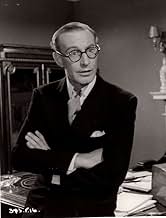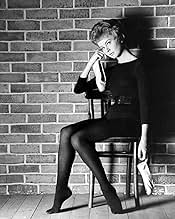Ajouter une intrigue dans votre langueNorman Truscott is a store worker who dreams of stardom. Vernon Carew is a singer who's star is fading. Vernon manages to get a recording of Norman singing and passes it off as himself.Norman Truscott is a store worker who dreams of stardom. Vernon Carew is a singer who's star is fading. Vernon manages to get a recording of Norman singing and passes it off as himself.Norman Truscott is a store worker who dreams of stardom. Vernon Carew is a singer who's star is fading. Vernon manages to get a recording of Norman singing and passes it off as himself.
- Réalisation
- Scénario
- Casting principal
Alan Beaton
- Club Member
- (non crédité)
Barbara Bennett
- Lady in Theatre
- (non crédité)
Paul Beradi
- Party Guest
- (non crédité)
Eddie Boyce
- Theatre Patron
- (non crédité)
Richard Caldicot
- Conductor
- (non crédité)
Pauline Chamberlain
- Showgirl
- (non crédité)
Avis à la une
This is a lovely film starring a lovely man, with some genuinely funny moments. In the part where he gets hypnotised, you really see his acting ability. In a way it's sad that Norman Wisdom is not part of this day and age. If he was he may have taken on serious film roles, as the likes of Jim Carrey have. This is definitely one of his best films, and one that my whole family loves. He also has a great voice, and at some point must have had to make a decision whether to pursue a singing or acting career. Incidentally, Norman has great support from the likes of Hattie Jacques and John Le Measurier who give assured performances. A film from a different age.
One of the main plot points of the film is that Norman is afraid to sing in front of anyone, unless his girlfriend is present. And yet the first time we do see him singing it's at the theatre, amidst/in front of an audience, shamelessly upstaging the famous singer who gave him the free tickets in the first place... but his girlfriend couldn't even accompany him because she already had another engagement! Which makes his frequent later complaints that he can't sing because she's not there, ludicrous.
The best thing about the film is the many guest appearances, especially Ron Moody as the doleful violinist. But as far as I'm concerned, Jerry Desmonde is the true star of the film - his television performance of his new hit song is hysterical. But why on earth did Vernon Carew think that Norman's singing voice would revive his career? I can only imagine what Vernon's faithful fans would think of his transition from mellow crooner to sounding - in that particular song - like a cross between Huckleberry Hound and Goofy! (To be brutally frank, I can't believe anyone in the real world would think that was a good singing voice.)
I can't say I'm a huge fan of Norman Wisdom : he's okay in small doses, but quite often his scenes of gurning and capering go on so long they become intolerable. Having an idea of what he was like in real life (thanks to the many TV interviews he gave) it's clear that he had a pretty high opinion of himself and his many talents, and that comes across in his many of his films - especially the later ones where he has more involvement in the writing, staging, and so on.
Norman Wisdom was an English comedian much loved during much of the Fifties, and while his success persisted well into the Swinging Sixties, it did so in a spirit redolent of the previous far more innocent decade. His image was that of a perilously naive and inept, yet wholly adorable little man whose sweetness of nature could be said to somehow put the pretensions of souls less humble and self-sacrificing than he to shame. The "Norman" character being a pure-hearted soul for a time when the West's traditional moral values, rooted in its Judeo-Christian foundation, yet possessed considerable influence. And while "Follow a Star", directed by Robert Asher in 1959, with Wisdom appearing as worker and aspiring singer Norman Truscott, is perhaps among his less well-known movies, few are quite so successful in showcasing his incredible talents. While among its many delights are the melodic and moving title song, written by the great man himself, and sung by him in a surprisingly mature baritone crooning voice. Also starring are superb Wisdom regular Jerry Desmonde as irasible fading singer Vernon Carew; Hattie Jacques as Norman's well-meaning but somewhat over-enthusiastic singing teacher Miss Dobson; and the lovely June Laverick, as his sweetheart Judy, who provides Wisdom with the opportunity to present his more serious and romantic side. And who can blame him. While several stalwarts of a classic age of British comedy also appear, including Richard Wattis, as the pompous psychiatrist Dr Chatterway; John Le Mesurier, as the redoubtable waiter Birkett; Fenella Fielding as the elegant Lady Finchington; and Pat Coombs uncredited as a young woman in a theatre. But the movie as a whole is a joy from a simpler time, when Rock and Roll had been more or less shorn of its initial threat, and Beatlemania almost half a decade away.
"Truscott" (Norman Wisdom) spends much of his days at work in a laundry dreaming of a stardom that might just come his way when he encounters legendary crooner "Vernon Carew" (Jerry Desmonde). This man's star is very much on the wain until he hears his new friend sing and hits on the idea of "borrowing" his voice - without telling or paying him, of course. His career rejuvenated, it's only his vocal coach "Dymphna" (Hattie Jacques) who recognises the true owner of the voice but what to do. "Truscott" can only sing if his beloved "Judy" (June Laverick) is there to encourage him and that's not possible right now. As "Carew" heads to the bright lights of the London Palladium, our plucky hero's friends have to think of a way of showing where the real talent lies. How, though? This is another decent showcase for Wisdom to show that he had quite a few strings to his bow. His semi-slapstick comedy timing is perfect but here he proves that he can also hold a tune, delivering a few of the numbers that fit entertainingly into the story. The story itself, though, is far too long. It could readily lose half and hour and not suffer. Indeed were it a tighter production with less meandering, it'd be quite a solid tale that could have better played to Wisdom's strengths, those of writer Jack Davis and the very Rutherford-esque efforts of an on-form Jacques. As it is, it struggles to stay engaging until perhaps the last ten minutes when life is breathed back into it and some laughs are to be had. It's still quite a fun vehicle for it's star and is a perfectly watchable example of his work.
Being one of the infrequent Norman Wisdom vehicles covered in "Leonard Maltin's Movie & Video Guide" - which he rates a lowly *1/2 - I was wary of this title but, actually, it was quite pleasant if, in no way, a classic!
The very first scene is an inspired one: we see Norman's sweaty face in an atmosphere of overbearing heat (the film was shot by Jack Asher, a talented cameraman best known for his work for Hammer but who also happens to be the brother of the director!) meticulously going about his business thinking he works in a steamship or something, but eventually discovering that what he's doing is simply pressing a pair of pants (a sophisticated style of gag which has been utilized as early as Harold Lloyd's SAFETY LAST [1923]). The plot - a fading crooner 'borrowing' the voice of a naïve newcomer - is simple enough and has been partly lifted from SINGIN' IN THE RAIN (1952).
While the love interest is more sentimental than usual, since Norman's sweetheart is wheelchair-bound and he wants to make it as a singer mainly so as to have the money for her operation, the film provides plenty of amusing situations highlighting the ageing performer (Jerry Desmonde at his most despicable), ebullient elocutionist Hattie Jacques and long-suffering maitre d' John Le Mesurier; a party sequence halfway through the film also features a surprise early appearance by a dark-haired Charles Gray!
The very first scene is an inspired one: we see Norman's sweaty face in an atmosphere of overbearing heat (the film was shot by Jack Asher, a talented cameraman best known for his work for Hammer but who also happens to be the brother of the director!) meticulously going about his business thinking he works in a steamship or something, but eventually discovering that what he's doing is simply pressing a pair of pants (a sophisticated style of gag which has been utilized as early as Harold Lloyd's SAFETY LAST [1923]). The plot - a fading crooner 'borrowing' the voice of a naïve newcomer - is simple enough and has been partly lifted from SINGIN' IN THE RAIN (1952).
While the love interest is more sentimental than usual, since Norman's sweetheart is wheelchair-bound and he wants to make it as a singer mainly so as to have the money for her operation, the film provides plenty of amusing situations highlighting the ageing performer (Jerry Desmonde at his most despicable), ebullient elocutionist Hattie Jacques and long-suffering maitre d' John Le Mesurier; a party sequence halfway through the film also features a surprise early appearance by a dark-haired Charles Gray!
Le saviez-vous
- AnecdotesTony Hatch wrote a song for the film, but Norman Wisdom insisted that he should be allowed to write the theme song. Hatch's song was re-titled and used in "Le Cirque des horreurs (1960)."
- GaffesNorman is talking to the hypnotist at 1:10:00 his lips do not match what the voice over is saying about "like I depend on..."
- ConnexionsFeatured in Norman Wisdom: His Story (2010)
- Bandes originalesFollow a Star
by Norman Wisdom
Meilleurs choix
Connectez-vous pour évaluer et suivre la liste de favoris afin de recevoir des recommandations personnalisées
Détails
- Date de sortie
- Pays d’origine
- Langue
- Aussi connu sous le nom de
- Enayiler Kralı Yıldızlar Peşinde
- Lieux de tournage
- Société de production
- Voir plus de crédits d'entreprise sur IMDbPro
- Durée1 heure 42 minutes
- Couleur
- Mixage
- Rapport de forme
- 1.37 : 1
Contribuer à cette page
Suggérer une modification ou ajouter du contenu manquant

Lacune principale
By what name was Follow a Star (1959) officially released in Canada in English?
Répondre




























